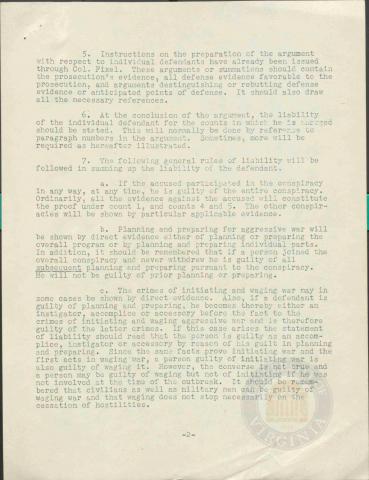
Page 2
| Parent | Instructions for Preparation of Individual Summations |
|---|---|
| Date | 6 January 1948 |
| Language | English |
| Collection | Tavenner Papers & IMTFE Official Records |
| Box | Box 6 |
| Folder | General Reports and Memoranda from January 1948 |
| Repository | University of Virginia Law Library |
5.Instructions on the preparation of the argument with respect to individual defendants have already been issued through Col. Fixel. These arguments or summations should contain the prosecution's evidence, all defense evidence favorable to the prosecution, and arguments distinguishing or rebutting defense evidence or anticipated points of defense. It should also draw all the necessary references.
6.At the conclusion of the argument, the liability
of the individual defendant for the counts in which he is charged should be stated. This will normally be done by reference to paragraph numbers in the argument. Sometimes, more will be required as hereafter illustrated.
7. The following general rules of liability will be followed in summing up the liability of the defendant.
d. If the accused participated in the conspiracy in any way, at any time, he is guilty of the entire conspiracy. Ordinarily, all the evidence against the accused will constitute the proof under count 1, and counts 4 and 5. The other conspir¬acies will be shown by particular applicable evidence.
e. Planning and preparing for aggressive war will be shown by direct evidence either of planning or preparing the overall program or by planning and preparing individual parts. In addition, it should be remembered that if a person joined the overall conspiracy and never withdrew he is guilty of all subsequent planning and preparing pursuant to the conspiracy.
He will not be guilty of prior planning or preparing.
f. The crimes of initiating and waging war may in some cases be shown by direct evidence. Also, if a defendant is guilty of planning and preparing, he becomes thereby either an instigator, accomplice or accessory before the fact to the crimes of initiating and waging aggressive war and is therefore guilty of the latter crimes. If this case arises the statement of liability should read that the person is guilty as an accom-plice, instigator or accessory by reason of his guilt in planning and preparing. Since the same facts prove initiating war and the first acts in waging war, a person guilty of initiating war is also guilty of waging it. However, the converse is not true and a person may be guilty of waging but not of initiating if he was not involved at the time of the outbreak. It should be remem¬bered that civilians as well as military men can be guilty of waging war and that waging does not stop necessarily on the cessation of hostilities.
-2-
